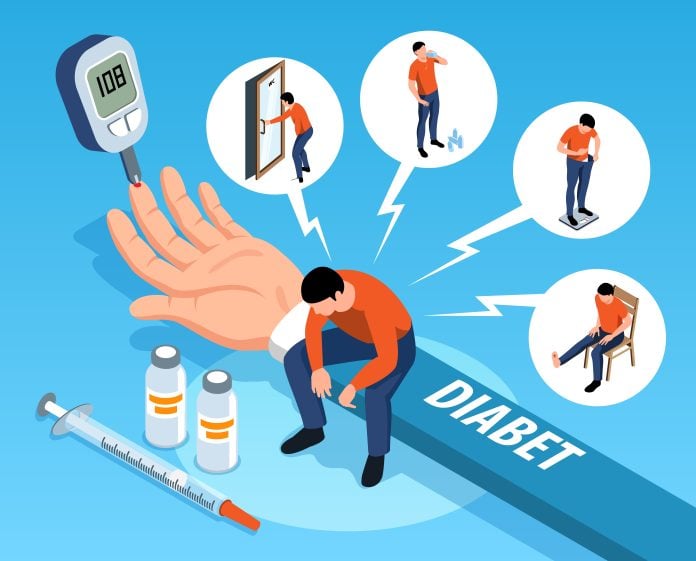
This post may contain affiliate content from which we earn a small commission at no additional cost to you. Read our full disclosure.
Curious about the secret weapon against diabetes? Picture this: What if I told you that losing those extra pounds could be the game-changer? Welcome to the discussion on “Can Weight Loss Reverse Diabetes.”
Let’s break it down in simple terms – we’re about to explore whether shedding weight is more than just a numbers game. So, grab a seat as we uncover the link between weight loss and turning the tables on diabetes!
Understanding the Diabetes Epidemic
Diabetes has reached epidemic proportions globally, affecting millions of people and imposing a significant burden on healthcare systems. The two primary types of diabetes, Type 1 and Type 2, differ in their origins, but Type 2 diabetes, often linked to lifestyle factors, constitutes the majority of cases.
Obesity and sedentary lifestyles have been identified as major contributors to the rising prevalence of Type 2 diabetes, prompting a closer look at weight management as a potential solution.
The Role of Weight Loss in Diabetes Management

Impact of Weight Loss on Insulin Sensitivity
One of the key factors in diabetes is insulin resistance, where the body’s cells become less responsive to insulin. Studies have shown that excess body fat, particularly visceral fat surrounding internal organs, contributes to insulin resistance.
Weight loss, especially through a combination of diet and exercise, has been demonstrated to improve insulin sensitivity, potentially reversing the early stages of Type 2 diabetes.
Caloric Restriction and Metabolic Changes
Caloric restriction, a fundamental aspect of weight loss, triggers various metabolic changes in the body.
Research suggests that reducing calorie intake can lead to a decrease in fat accumulation in the liver and pancreas, organs crucial for insulin production and regulation. As these organs regain normal function, diabetes symptoms may be alleviated.
The Link Between Weight Loss and Glycemic Control
Maintaining stable blood sugar levels is a primary goal in diabetes management. Weight loss, particularly when achieved through a balanced and sustainable approach, has been associated with improved glycemic control.
This implies that shedding excess weight can positively influence the body’s ability to regulate blood sugar, potentially reversing the progression of diabetes.
Challenges and Considerations
Individual Variability in Response
While the evidence supporting the link between weight loss and diabetes reversal is promising, it’s crucial to acknowledge that individuals may respond differently.
Factors such as genetic predisposition, age, and overall health can influence how effectively weight loss impacts diabetes. Personalized approaches to treatment may be necessary for optimal outcomes.
Long-Term Sustainability of Weight Loss
Achieving weight loss is often challenging, but maintaining it over the long term poses an even greater hurdle. Many individuals experience weight regain after initial success, potentially impacting the benefits gained in terms of diabetes reversal.
Sustainable lifestyle changes, including ongoing dietary modifications and regular physical activity, are vital for lasting effects.
Exploring Successful Interventions
Bariatric Surgery as a Tool for Diabetes Reversal
In cases of severe obesity and diabetes, bariatric surgery has emerged as a noteworthy intervention. Beyond its impact on weight loss, bariatric procedures like gastric bypass have demonstrated remarkable effects on diabetes reversal.
The mechanisms at play go beyond simple weight reduction, involving hormonal changes that positively influence glucose metabolism.
Dietary Approaches for Diabetes Reversal
Various dietary strategies, such as low-carbohydrate diets and intermittent fasting, have gained attention for their potential in diabetes management. These approaches not only contribute to weight loss but also exert direct effects on blood sugar regulation.
Customizing dietary plans based on individual preferences and tolerances is crucial for sustained success.
Exercise as a Catalyst for Diabetes Reversal

Physical activity plays a pivotal role not only in weight loss but also in mitigating the effects of diabetes. Regular exercise improves insulin sensitivity, allowing cells to better respond to insulin.
Additionally, it contributes to weight loss by burning calories and enhancing overall metabolic function. Combining a well-rounded exercise routine with dietary modifications can amplify the positive effects of diabetes reversal.
Psychosocial Factors and Diabetes Reversal
The relationship between mental health and diabetes reversal is gaining recognition. Stress, anxiety, and depression can adversely affect metabolic processes and hinder weight loss efforts.
Incorporating strategies to address psychosocial well-being, such as mindfulness practices and support networks, may enhance the effectiveness of interventions aimed at reversing diabetes. A holistic approach that considers both physical and mental health is crucial for comprehensive diabetes management.
Effective Weight Loss Strategies
- Healthy Lifestyle: Adopt a balanced diet and regular exercise.
- Portion Control: Be mindful of serving sizes to prevent overeating.
- Hydration: Stay adequately hydrated to curb unnecessary snacking.
- Weight Loss Injections: When necessary, under professional guidance, consider injections containing medications that regulate appetite, boost metabolism, or aid in fat breakdown. For more information, you can check our article “Which weight loss injection is best”
- Professional Guidance: Consult healthcare providers before making significant changes. Monitor progress and make adjustments based on individual responses.
Beyond Body – Weight Loss Facilitator
Beyond Body sets itself apart by providing personalized meal and workout plans designed to suit individual preferences. The customized 28-day meal program elevates the concept of healthy eating, turning it into a pleasurable journey that cultivates a passion for nourishing and delicious meals.
Beyond Body goes beyond being just a weight loss tool; it serves as a personalized companion guiding you toward a healthier and more fulfilling life path.
That said, if you’re interested in trying this app read our full Beyond Body review then click here to take a quick quiz and get started. You can even get up to 60% off by using the code below:


Beyond Body - 67% Off Discount Code
Final Words
In simple terms, losing weight can be a real superhero move to tackle diabetes. Research shows that shedding those extra pounds may flip the script on diabetes. It’s like giving your body a boost to fight off sugar villains.
So, hitting the gym and making healthy food choices could be your sidekick in the battle against diabetes. Remember, every small step towards a healthier you can be a victory over diabetes.
FAQs on “Can Weight Loss Reverse Diabetes?”
Can diabetes go away if you lose weight?
Losing weight can help improve diabetes, as it can lower blood sugar levels. When you shed pounds, your body becomes more efficient in using insulin. However, it’s essential to note that diabetes may not entirely disappear. Instead, weight loss can significantly manage and sometimes even improve the condition.
How much weight do I need to lose to reverse diabetes?
The amount of weight needed to reverse diabetes varies for each person. Generally, even a modest weight loss of 5-10% of your body weight can have a positive impact on diabetes. It’s not about a specific number on the scale, but rather the overall improvement in your body’s ability to regulate blood sugar levels.
When is it too late to reverse type 2 diabetes?
It’s never too late to make positive changes, but the earlier, the better. While there’s no fixed point where it’s too late to reverse type 2 diabetes, the longer the condition persists, the more challenging it can become.
Starting a healthier lifestyle, including weight loss, can still provide benefits, so it’s never too late to take steps toward improving your overall health.
- Online Vs In-Person Certification Courses: Pros & Cons - April 23, 2024
- Tips for Acing Your Fitness Certification Exam - April 21, 2024
- Balancing Work-Life as a Fitness Trainer: Complete Guide - April 19, 2024
Disclosure: In the spirit of full disclosure, DIYactive.com may be compensated in exchange for featured placement of certain reviews or links on this website. View our full disclosure.



